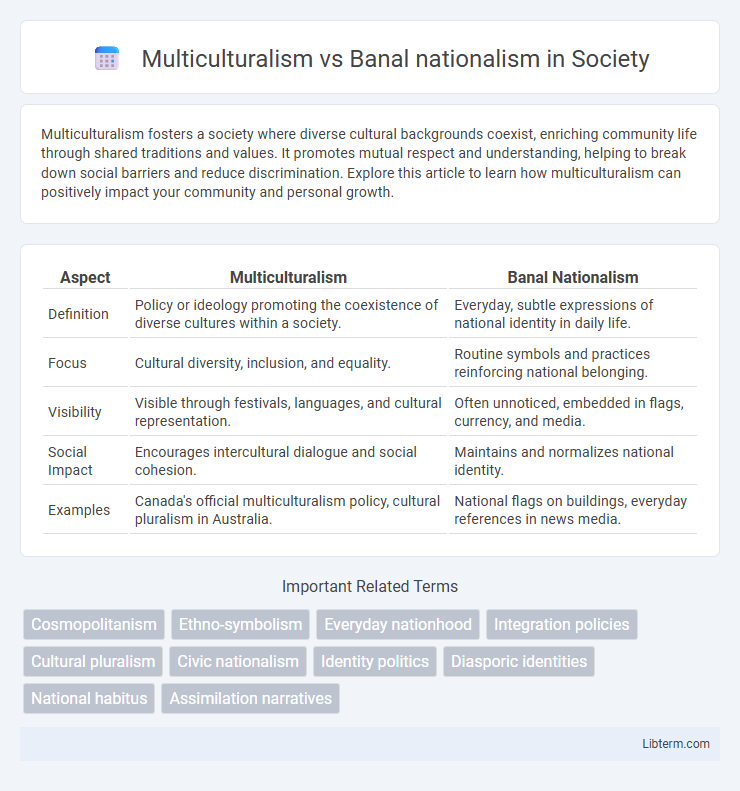Multiculturalism fosters a society where diverse cultural backgrounds coexist, enriching community life through shared traditions and values. It promotes mutual respect and understanding, helping to break down social barriers and reduce discrimination. Explore this article to learn how multiculturalism can positively impact your community and personal growth.
Table of Comparison
| Aspect | Multiculturalism | Banal Nationalism |
|---|---|---|
| Definition | Policy or ideology promoting the coexistence of diverse cultures within a society. | Everyday, subtle expressions of national identity in daily life. |
| Focus | Cultural diversity, inclusion, and equality. | Routine symbols and practices reinforcing national belonging. |
| Visibility | Visible through festivals, languages, and cultural representation. | Often unnoticed, embedded in flags, currency, and media. |
| Social Impact | Encourages intercultural dialogue and social cohesion. | Maintains and normalizes national identity. |
| Examples | Canada's official multiculturalism policy, cultural pluralism in Australia. | National flags on buildings, everyday references in news media. |
Understanding Multiculturalism: Definition and Key Principles
Multiculturalism is a social and political framework promoting the recognition and inclusion of diverse cultural identities within a unified society, emphasizing equality, respect, and coexistence among different ethnic groups. Key principles include cultural pluralism, where multiple cultural traditions coexist without assimilation pressures, and policies fostering equal opportunities and anti-discrimination measures. This contrasts with banal nationalism, which involves subtle, everyday expressions of national identity reinforcing dominant cultural narratives and often marginalizing minority cultures.
Banal Nationalism: Everyday Symbols and Hidden Messages
Banal nationalism manifests through everyday symbols such as flags, currency, and official language, subtly reinforcing national identity in routine life without overt political discourse. These hidden messages normalize nationalism by embedding loyalty and belonging into mundane activities, influencing citizens' perceptions unconsciously. Unlike multiculturalism, which emphasizes diversity and inclusion, banal nationalism perpetuates a homogeneous national narrative through passive daily rituals.
Historical Roots of Multiculturalism and Nationalism
Multiculturalism originated in the post-World War II era, particularly during the 1960s and 1970s, as countries like Canada, Australia, and the United Kingdom sought to manage increasing immigration and cultural diversity through inclusive policies. Banal nationalism, a concept introduced by Michael Billig in 1995, refers to the everyday, often unnoticed representations of the nation that reinforce national identity through routine symbols like flags, currency, and language. The historical roots of nationalism trace back to the 19th century European nation-state formation, where shared language, culture, and history became central to collective identity, contrasting with multiculturalism's focus on coexistence of diverse cultural groups within a single society.
Policy Approaches: Multiculturalism vs Banal Nationalism
Multiculturalism policy approaches emphasize the recognition and accommodation of diverse cultural identities within a society, promoting inclusion through legal frameworks and educational programs aimed at fostering pluralism. Banal nationalism manifests subtly in everyday practices and symbols, reinforcing national identity through mundane rituals and institutions without overt political discourse. Policymakers balance these approaches by integrating multicultural policies that address group-specific rights while acknowledging the pervasive, often unnoticed influence of banal nationalist narratives on social cohesion.
Media Representation: Celebrating Diversity or Reinforcing the Nation?
Media representation in multiculturalism highlights diverse cultural narratives, enriching societal understanding by portraying multiple ethnicities, languages, and traditions authentically. Conversely, banal nationalism in media subtly reinforces national identity through symbols, rituals, and everyday imagery, often prioritizing a homogeneous national story over minority perspectives. This contrast shapes public perception by either celebrating pluralism or perpetuating a dominant national framework that marginalizes cultural differences.
Social Integration: Challenges and Opportunities
Multiculturalism promotes social integration by recognizing and valuing diverse cultural identities, encouraging inclusivity and mutual respect within societies. Banal nationalism, through everyday symbols and rituals, fosters a subtle, shared national identity that can unify individuals but may also marginalize minority groups. Balancing multicultural policies with inclusive national narratives presents opportunities to strengthen social cohesion while addressing challenges of cultural recognition and social equity.
Impact on National Identity and Belonging
Multiculturalism fosters an inclusive national identity by recognizing and celebrating diverse cultural backgrounds, enhancing a sense of belonging among minority groups and promoting social cohesion. Banal nationalism, through everyday symbols and rituals like flags and national anthems, subtly reinforces a shared national identity experienced collectively by citizens. The contrasting impacts shape how individuals relate to their nation: multiculturalism broadens belonging by emphasizing pluralism, while banal nationalism maintains unity by cultivating routine, symbolic national pride.
Education and the Shaping of Cultural Narratives
Multiculturalism in education emphasizes the inclusion of diverse cultural perspectives, promoting an understanding and appreciation of different identities within the curriculum. Banal nationalism subtly reinforces national identity through everyday symbols and practices embedded in educational settings, shaping students' perceptions of belonging. The interplay between these forces influences how cultural narratives are constructed, either broadening inclusivity or reinforcing dominant national norms in schools.
Case Studies: Global Perspectives on Multiculturalism and Nationalism
Case studies from Canada, Malaysia, and Belgium highlight diverse approaches to multiculturalism and banal nationalism, illustrating how state policies shape ethnic coexistence and national identity. In Canada, multiculturalism promotes inclusivity and cultural preservation through official policies, contrasting Malaysia's model of ethnic prioritization embedded in nationalist discourse. Belgium's linguistic divisions reveal banal nationalism's subtle reinforcement of group identities, demonstrating the complexities of managing multicultural societies within nation-states.
Looking Ahead: Balancing Diversity and Unity
Multiculturalism promotes diversity by encouraging the coexistence of multiple cultural identities within a society, while banal nationalism subtly reinforces a shared national identity through everyday symbols and rituals. Balancing these forces involves creating inclusive policies that honor cultural differences without eroding the unifying narratives essential for social cohesion. Future approaches must integrate multicultural values into national stories to foster unity amid diversity, ensuring both cultural recognition and collective belonging.
Multiculturalism Infographic

 libterm.com
libterm.com